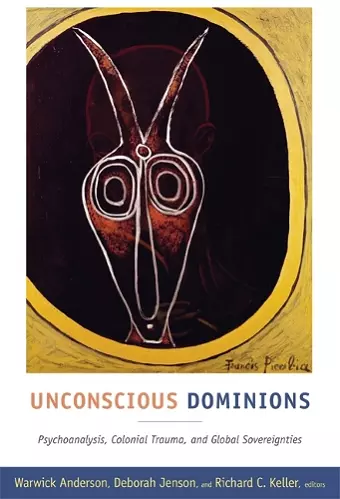Unconscious Dominions
Psychoanalysis, Colonial Trauma, and Global Sovereignties
Warwick Anderson editor Deborah Jenson editor Richard C Keller editor
Format:Paperback
Publisher:Duke University Press
Published:3rd Oct '11
Currently unavailable, and unfortunately no date known when it will be back

Explores the globalization of the unconscious as a mediating discourse of modern civilization, its discontents, and its others
Comparative case studies reveal the multiple relations between psychoanalysis and globalization, showing how imperial ideologies were incorporated into early psychoanalytic theory, and how psychoanalysis has been reconfigured to critique imperialism.By the 1920s, psychoanalysis was a technology of both the late-colonial state and anti-imperialism. Insights from psychoanalysis shaped European and North American ideas about the colonial world and the character and potential of native cultures. Psychoanalytic discourse, from Freud’s description of female sexuality as a “dark continent” to his conceptualization of primitive societies and the origins of civilization, became inextricable from the ideologies underlying European expansionism. But as it was adapted in the colonies and then the postcolonies, psychoanalysis proved surprisingly useful for theorizing anticolonialism and postcolonial trauma.
Our understandings of culture, citizenship, and self have a history that is colonial and psychoanalytic, but, until now, this intersection has scarcely been explored, much less examined in comparative perspective. Taking on that project, Unconscious Dominions assembles essays based on research in Australia, Brazil, France, Haiti, and Indonesia, as well as India, North Africa, and West Africa. Even as they reveal the modern psychoanalytic subject as constitutively colonial, they shed new light on how that subject went global: how people around the world came to recognize the hybrid configuration of unconscious, ego, and superego in themselves and others.
Contributors
Warwick Anderson
Alice Bullard
John Cash
Joy Damousi
Didier Fassin
Christiane Hartnack
Deborah Jenson
Richard C. Keller
Ranjana Khanna
Mariano Plotkin
Hans Pols
“A truly remarkable achievement, this book moves humanistic interpretation of psychoanalysis away from the polarities of unquestioned universality and postcolonial deconstructionism that has dominated the literature and toward an engagement with the tense, conflicted, frequently paradoxical spaces between these absolutes: the place where all sovereignties and subjectivities ultimately reside.”
- Matthew M. Heaton, Bulletin of the History of Medicine
“Unconscious Dominions is a unique, groundbreaking conversation on globalization and psychoanalysis. Internationally respected scholars take on terrific historical questions, vital conceptual puzzles, and pressing social relations in the process of revealing the psychoanalytic unconscious to be both a mobile mechanism of empire and an opportunity for the liberation from empire.”—Elizabeth A. Povinelli, author of Economies of Abandonment: Social Belonging and Endurance in Late Liberalism
“This marvelous collection maps human subjectivities as they have been reshaped by colonialism to ensure the emergence of a cosmopolitan, psychoanalytic subject and the globalization of the unconscious. Indeed, the editors and the authors propose that the myriad forms of globalization we see around us assume this new cosmopolitan self and so do the new ideas of living with cultural diversities and perhaps even dissent. Both the psychoanalytic subject and the globalized unconscious have their origins in colonial psychiatry and psychoanalysis and both now have to negotiate the diffusion and fragmentation of sovereignties in our times. Unconscious Dominions is fresh, lively and provocative and can be read as a travelogue on our incomplete journeys into our disowned selves.”—Ashis Nandy, author of The Intimate Enemy: Loss and Recovery of Self under Colonialism
“A truly remarkable achievement, this book moves humanistic interpretation of psychoanalysis away from the polarities of unquestioned universality and postcolonial deconstructionism that has dominated the literature and toward an engagement with the tense, conflicted, frequently paradoxical spaces between these absolutes: the place where all sovereignties and subjectivities ultimately reside.”
-- Matthew M. Heaton * Bulletin of the History of Medicine *
ISBN: 9780822349792
Dimensions: unknown
Weight: 476g
328 pages